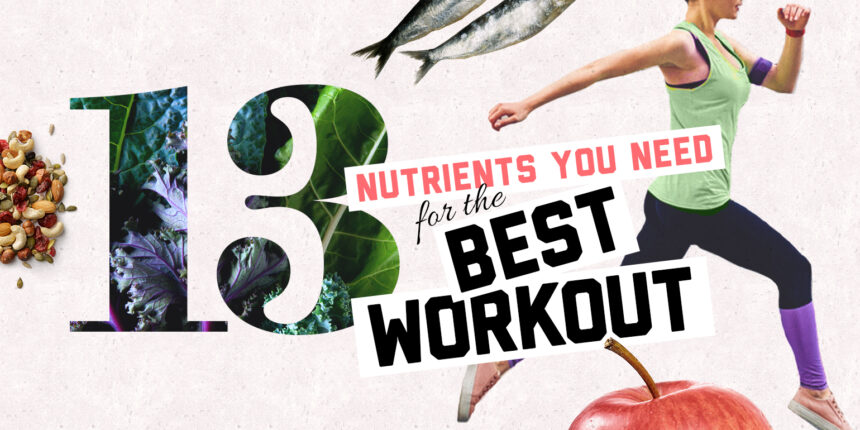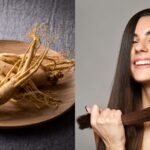You already know about carbohydrates, proteins and fats. Collectively known as the main nutrient, it is important to make the most of your sports nutrition and training (not to mention staying alive).
Generally, carbohydrates and fats provide fuel, while protein provides the building blocks needed to restore and build muscle. However, nutrients also play an important role in metabolism and help the body gain energy when needed, the Academy of Nutrition and Nutrition spokesmanship, MS, RDN, CLT.
translation? Create some of the various nutrients in your sports nutrition plan. This way, keep the energy flag at bay, while deriving many other benefits from the exercise.
The following nutrients have particular advantages in terms of supercharger energy, faster muscle recovery, and maintaining humming of immune function.
Payoff? It looks so good that it feels strong and healthy.
Vitamin B and choline
What they do: Promotes muscle performance and recovery, increasing energy and endurance
Vitamins B2 (also known as riboflavin), B6, and B12 allow the body to convert nutrients into energy, transport oxygen throughout the body, maintain red blood cell count, and assist in muscle function.
Therefore, they are extremely important for hardcore training regimens.
“Most Americans have a lot, like you can see in meat, chicken and turkey,” says Dr. Katherine Mix. “Vitamin B deficiency can lead to problems, but getting more than you need it never helps. There is no evidence that athletes have higher requirements.”
Choline offers different benefits, found in many of the same foods as vitamin B.
According to Dr. Mix, there are studies that are important for brain health, cell development, muscle function and durability, suggesting that many people are not getting enough micronutrients.
How to get them: Meat eaters can get enough BS via a serving of salmon or other fatty fish, beef, or turkey (about 3 oz).
Eggs and dairy products should be the vegetarian focus. Vegetarians can eat fortified cereal, soy milk, and nutrient yeast for B-fix along with vegans.
Other sources of vitamin B2 include walnuts, sunflower seeds, bananas and lentils. Foods containing B6 include fish, chicken, eggs, milk and whole grains.
Choline comes from the whole egg, meat and chickpeas, among other sauces. However, your body cannot absorb much B vitamins at once, so divide your daily consumption into several meals and snacks.
According to Dr. Mikus, most people point out that Bitamins B overload doesn’t bring any benefits, and that’s just what you need from a moderately healthy diet.
Antioxidants
What they do: Reduces inflammation and prevents cell damage
According to Julieanna Hever, MS, Rd., Antioxidants are a group of important but underrated nutrients.
She points out that carotenoids, vitamins C and E, and selenium are especially great for recovery from workouts. Vitamin E is especially useful Blood production and protection of the body’s cells.
“Both antioxidants and phytonutrients help reduce the harsh effects of exercise, including oxidation and inflammation,” explains Heber.
However, due to the mixed research findings, more research is needed regarding the role of vitamin C in exercise performance and recovery, says Mix.
“There is not much scientific evidence to suggest that supplemental vitamin C helps people with athletic performance or recovery, like the most essential vitamins and minerals,” she says. “In fact, some studies suggest that supplemental vitamin C may interfere with favourable adaptation to exercise training.”
How to get them: Seeds and nuts are a good source of vitamin E, citrus fruits and peppers, peppers provide plenty of vitamin C, and organ meat and seafood provide healthy amounts of selenium.
Phytonutrients
Phytonutrients, or phytochemicals, are the active ingredients of plants (“plant” is derived from the Greek word for plants), fruits, and vegetables that help protect them from diseases, predators, and other threats.
Dr. Mikus says some have been shown to provide health benefits and help with exercise performance and recovery.
Anthocyanins (tart cherry)
What they do: Helps intensification recovery and improves aerobic performance
The blend of tart cherry juice reduced muscle loss and muscle pain from intense exercise during the study published in British Journal of Sports Medicine. Tart cherry juice improved muscle recovery after intense exercise, a 2011 study suggests.
Supplements are also beneficial.
According to a 2015 survey Sports Nutrition International Journal23 enthusiastic male strength trainers reduced muscle soreness after exercise due to tart cherry supplementation.
Furthermore, according to a study in the same journal published the following year, durable runners showed improved performance and reduced exercise-induced inflammation after a brief refill of Montmorasie tart cherry powder.
How to get it: Actors could benefit from two servings of 480 mg of tart cherry extract a day, about 300 ml of tart cherry juice shot a day, or 30 ml of tart cherry juice concentrate, Dr. Mix said.
Nitrate (Beetroot)*
What they do: Improve aerobic and muscle performance and enhance endurance
A 2013 study found that beetroot juice containing inorganic nitrates helps lower blood pressure and use less oxygen to maintain moderate exercise levels.
Furthermore, runners did not reach fatigue as quickly as subjects who drank placebo drinks. A 2013 study found that dietary nitrates that delayed fatigue in active subjects during intense training slowed fatigue.
Another study of heart failure patients in 2015 found that beetroot juice increases muscle strength. Although the findings have not yet been extrapolated to the larger population, the results are encouraging.
How to get it: Lush greenery, beetroot juice, supplements
*It is important to note that nitrates that occur naturally in foods such as green leafy vegetables, celery and beetroot differ from widely slandered nitrate salts commonly used as processed meats such as bacon, hot dogs, and deli meats.
Curcumin
What it does: Reduces exercise-induced inflammation and relieves muscle pain
Curcumin, the most active compound in Spisturmeric, is a powerful anti-inflammatory agent that appears to help reduce muscle damage caused by exercise, says Hever.
Subjects had less limb pain and muscle damage, and inflammation appeared to decrease through curcumin supplementation in a 2014 study published in 2014. Journal of the International Society of Sports Nutrition.
Furthermore, a 2015 study suggests that curcumin supplementation can help reduce muscle pain and is promising as aid in muscle recovery.
How to get it: Supplements or turmeric.
Quercetin
What it does: Improve aerobic performance
While onions and apples are not exactly sports nutrition A-listers, the research suggests that, as a 2009 study of cyclists found, the phytochemicals contained in each can reduce inflammation and oxidative stress.
And untrained male runners experienced “small but substantial” improvements in the 12-minute treadmill time trial, a 2010 study concluded by a quercetin study.
However, a review of a study published in 2013 states that quercetin has been shown to improve endurance exercise by 2-3%.
How to get it: Supplements like apples and onions, beach body performance provide hydration and energy
Elagitannin (pomegranate)
What they do: Improves muscle strength recovery after workouts and relieves muscle pain
It is rich in antioxidants and polyphenols, and pomegranate juice is a form of eccentric exercise (if muscles become longer rather than shorter during contraction, consider some of the weight curls when lowering weight).
Subjects were reported to have less elbow pain after resistance training when refilling large amounts of (500 ml) of pomegranate juice, the authors of the paper wrote. Journal of Strength and Conditioning Research.
Pomegranate extract also significantly improved muscle strength recovery after 2-3 days of eccentric movement, Medicine and science in sports and exercise 2010.
How to get it: Pomegranate juice
Conclusion
Rather than thinking of these nutrients and phytochemicals as quick fixes, Angelone warns them to think of them as boosters of an already healthy diet.
“Some of these substances can minimize the oxidation that occurs during exercise, while others can reduce inflammation,” says Angelone. “And they can play a role in performance, but only if there’s a basic foundation for good nutrition there.”
The supplement’s beach body performance line contains many of the nutrients listed above, with pre-exercise energy (energy), training hydration (hydrate), and post-workout recovery (recovery).
The entire line draws on cutting-edge science and plant-based extracts, phytonutrients and other natural ingredients to round out your complete sports nutrition plan, improving performance and recovery without artificial colours, tastes, sweeteners or preservatives.











